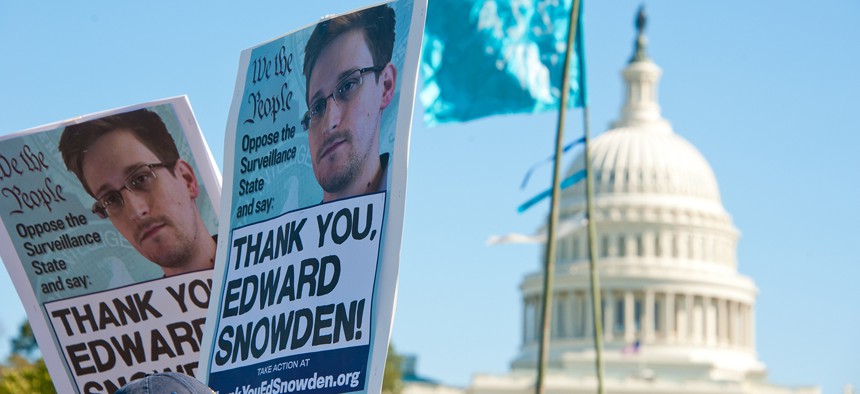
Protestors rally in support of Edward Snowden in 2013. Rena Schild / Shutterstock.com file photo
Edward Snowden Unwittingly Killed Justice's Mass-Surveillance Program
By exposing the NSA’s spying regime, the former contractor forced the department to shut down a separate phone-surveillance operation.
It has been a pretty good week for Edward Snowden.
The polarizing leaker of government secrets rocketed back into public awareness, thanks to an interview with viral-hit-maker and comedian-with-a-conscience John Oliver. Then Snowden enthusiasts installed a bust of him in a Brooklyn park—which was later replaced with a hologramof his likeness. And actor Joseph Gordon-Levitt is traipsing around Washington, D.C., filming scenes as Snowden for the Oliver Stone movie about the fugitive slated for release later this year.
But likely nothing will bring the former National Security Agency contractor as much satisfaction as finding out this week that his 2013 disclosures appear to have prompted the Justice Department to pull the plug on a secret mass-surveillance program—one he isn't even responsible for exposing.
USA Today reported on Tuesday that a Justice Department program had, from 1992 to 2013, collected records of Americans' international phone calls. Described as a "blueprint" for the NSA's controversial dragnet, the program, housed within the Drug Enforcement Administration, "amassed logs of virtually all telephone calls from the USA to as many as 116 countries linked to drug trafficking," according to the paper. Those countries included U.S. neighbors Canada and Mexico, as well as parts of Europe and nearly all of central and South America.
The DEA surveillance net was remarkably similar to the NSA program. It collected in bulk the phone metadata—that is, the numbers, time-stamps, and duration of a call but not its content—of all U.S. calls placed to targeted foreign countries. Unlike the NSA, the DEA dragnet did not include wholly domestic calls, but it did appear to lack a number of internal safeguards or judicial oversight.
The blockbuster story exposes several new details about the size, history, and rationale of the DEA operation, which the Justice Department acknowledged in general terms existed in court documents submitted in January. But perhaps most surprising is that the pressure applied to NSA phone-spying—which is still ongoing—from the Snowden disclosures unknowingly brought about the downfall of the DEA program.
"It was made abundantly clear that they couldn't defend both programs," a former Justice Department official told USA Today.
It is generally understood that mass surveillance of Americans' communications records was a system adopted in the name of national security in the months and years following the September 11, 2001, terrorist attacks. Though at one time exclusively linked to the George W. Bush administration's aggressive security policies, the Snowden disclosures revealed that indiscriminate snooping is bipartisan, as President Obama has maintained, and in some cases expanded, surveillance programs.
But the DEA program presented the Obama administration with a problem: In the face of withering criticism prompted by the Snowden leaks, how could it defend the NSA's spying as necessary to protect national security when the DEA was running a similar program to track drug deals?
Attorney General Eric Holder decided it couldn't, and he ordered the program terminated in September 2013—just three months after Snowden's waterfall of leaks began.
"The Justice Department was going into court and saying, in part, 'What we're doing in this intelligence-surveillance program is OK, because it serves national security interests and it's not done for routine law enforcement,'" journalist Brad Heath, who broke the story, explained in a video interview posted on USA Today's site. "And then they sort of had the problem of, 'Well, we're doing something like this for routine law enforcement.' And at the end of the day they had to make a choice between the two programs."
So Holder chose to kill the DEA program. And he refused when DEA officials asked to revive it three months later.
(Image via Rena Schild / Shutterstock.com )
NEXT STORY: Do Your Stakeholders ‘Like’ You on Facebook?







